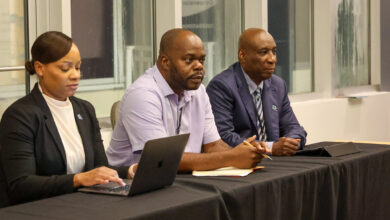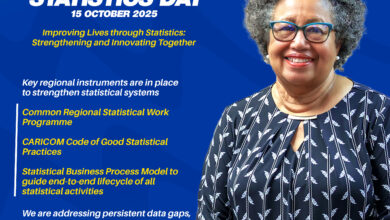His Excellency, the Governor-General of Grenada, Sir Daniel Williams and Lady Williams
Dr. the Rt. Hon. Keith Mitchell, Prime Minister of Grenada and Chairman of the Conference of Heads of Government of the Caribbean Community
Their Excellencies the Presidents of Guyana and of Suriname
Other Heads of Government of the Caribbean Community
Hon. Ministers
Members of the Diplomatic Corps
Members of Parliament
Heads of International and Regional Organisations
Specially invited guests and friends of CARICOM
Members of the Media
Ladies and gentlemen of the Caribbean Community
I deem it an honour to welcome you to the Opening Ceremony for this Twenty-Fifth Regular Meeting of the Conference of Heads of Government of the Caribbean Community. In doing so, I extend a very special welcome to the Hon. Prime Ministers of Dominica and Antigua and Barbuda, who are attending their first Meeting of the Conference. We welcome you warmly Prime Ministers and look forward to your vital contributions to the critical tasks on which the Community is embarked.
Heads of Government, permit me in these Opening Remarks, to reflect that this Meeting is being held at a time and place filled with historical significance for our Region. It was on the 4th of July 1973 that the Founding Fathers signed the Treaty of Chaguaramas, creating the Caribbean Community and Common Market (CARICOM). And it was here at Grand Anse, Grenada, in 1989, that the integration movement took some of its landmark decisions which continue to drive our integration agenda today.
We must also thank the Government and people of Grenada for their renowned warm hospitality and for the excellent arrangements they have provided for our deliberations. Indeed, it is in keeping with their outstanding contribution to our integration process – a contribution which can never really be forgotten.
That same spirit of contribution by the people of Grenada seems to have been extended well beyond Caribbean shores into Canada for example, where a distinguished daughter of Grenada, Ms. Jean Augustine, only was last week re-elected for a fourth consecutive term to the Canadian House of Commons. We salute and congratulate this most worthy member of the Caribbean Diaspora, recognising as well her support to our Community’s ongoing cooperation with Canada.
And speaking of contribution, I wish to express my own regret and that of the Community at the passing of Sir George F.C. Charles, former Chief Minister of Saint Lucia, who worked tirelessly for the development of his country and Region.
Heads of Government, we meet today, at a time when CARICOM, like other integration movements, is grappling with some new, more ambitious dimensions of regional integration. The times are certainly challenging and we must ensure that we fully understand our challenges so that we can resolve them to our benefit.
For example:
Decisive and sustained regional action is required if we are to successfully deal with the growing problem of HIV/AIDS and its devastating impact on Caribbean social life and on our human and economic resources;
United action is our only hope in confronting the challenges to regional security and stability from transnational criminal networks, which threaten the very foundations of our States. In fact, the Community has a moral obligation to help nurture peace and political stability throughout our Region.
A Community is in essence, a commingling of peoples. That requires among other things, effective modes of communication among its Member States. CARICOM can therefore only ignore the problem of intra-regional air transport to its peril.
Indeed, many of the difficulties facing the Region can only be solved through more, not less, regional integration.
It is true that in observing international developments, at times one may be led to the view that political fortunes can sometimes be at variance with the thrust towards regionalism.
It is interesting to note, however, that the ascendancy of opponents of integration in recent elections in Europe, did not deter European leaders from enhancing their integration process, with the adoption of a European Constitution, heralding a victory for co-operation, unity, compromise and reason. And, starting from widely differing positions, they were able to agree on the naming of a new Commission President. The Caribbean Community extends congratulations to Prime Minister Jose Durao Barroso of Portugal on his appointment.
These examples bring into sharp focus the need for CARICOM to move quickly to advance its own agenda for development. This calls not only for the settling of key outstanding issues, but also for the implementation of a number of decisions already taken including the Inauguration of the Caribbean Court of Justice and the introduction of the Caribbean Community Passport.
To achieve any meaningful advancement of our regional development agenda there must be sustained public education about the nature of the process, its impact, and the implications at every step. In simple terms the process must explain how each step is expected to affect the lives of the people of the Caribbean. The launch today of Radio CARICOM involving at this stage, Barbados, Belize, Grenada and Saint Lucia, is therefore, a vital first move in the right direction.
At their Tenth Meeting here at Grand Anse in July 1989, CARICOM Heads of Government asserted that: “People rather than institutions are the creators and producers of development.” Today we too, acknowledge the special roles of all our stakeholders in moving CARICOM forward.
The Grand Anse Declaration and Programme of Work of 1989 noted that the Heads of Government were, “inspired by the spirit of cooperation and solidarity among us (and) moved by the need to work expeditiously together to deepen the integration process and strengthen the Caribbean Community in all its dimensions to respond to the challenges and opportunities presented by the changes in the global economy.”
Today, may that vision of Grand Anse provide the framework and catalyst for our present efforts and be a guiding light for the future success of the regional integration process.
May this Twenty-Fifth Meeting be infused with the positive spirit that characterized the historic Tenth Meeting, and may Grand Anse once again work its magic for our leaders, our Community and our peoples.





